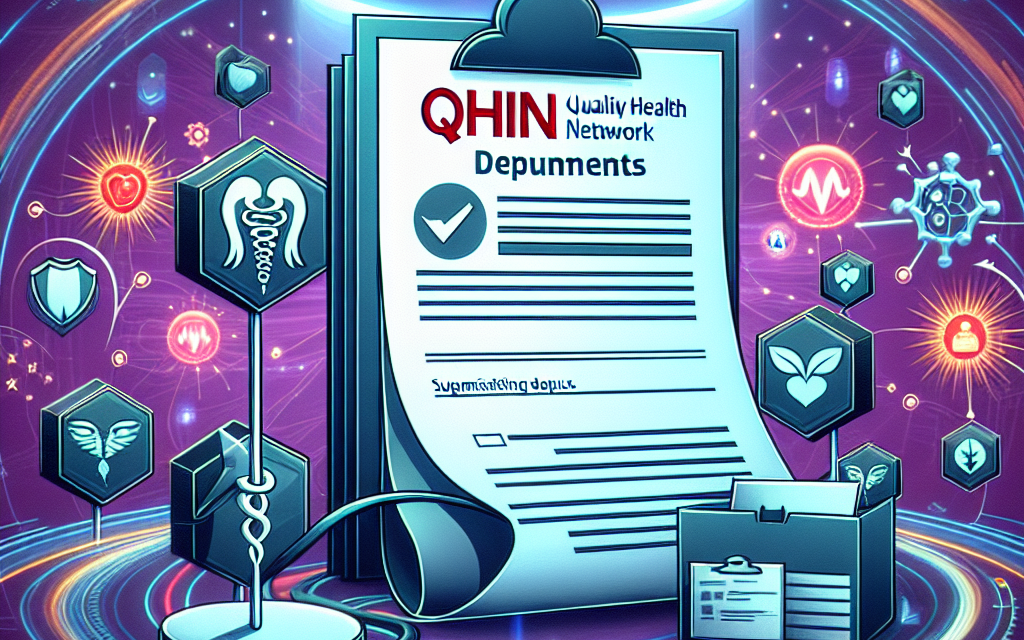Oracle Health Seeks QHIN Designation

In the rapidly evolving landscape of healthcare technology, Oracle Health is making significant strides by seeking designation as a Qualified Health Information Network (QHIN). This move is part of a broader initiative to enhance interoperability and data exchange across the healthcare ecosystem. As the healthcare industry continues to embrace digital transformation, the role of QHINs becomes increasingly crucial. This article delves into the intricacies of Oracle Health’s pursuit of QHIN designation, exploring its implications, challenges, and potential benefits.
Understanding the QHIN Framework
The concept of Qualified Health Information Networks (QHINs) is central to the Trusted Exchange Framework and Common Agreement (TEFCA), a policy initiative by the Office of the National Coordinator for Health Information Technology (ONC). TEFCA aims to establish a standardized approach to health information exchange, promoting seamless interoperability across different healthcare systems.
QHINs serve as the backbone of this framework, acting as intermediaries that facilitate the secure and efficient exchange of health information. They are responsible for ensuring that data flows smoothly between various healthcare entities, including hospitals, clinics, and other providers. By becoming a QHIN, Oracle Health would play a pivotal role in this national network, contributing to the overarching goal of improving patient care through enhanced data accessibility.
The QHIN framework is designed to address several key challenges in healthcare data exchange:
- Interoperability: QHINs aim to bridge the gap between disparate health IT systems, enabling them to communicate effectively and share data seamlessly.
- Security and Privacy: Ensuring the confidentiality and integrity of patient data is paramount. QHINs must adhere to stringent security protocols to protect sensitive information.
- Standardization: By establishing common standards and protocols, QHINs facilitate consistent data exchange practices across the healthcare industry.
Oracle Health’s pursuit of QHIN designation aligns with these objectives, positioning the company as a key player in the future of healthcare interoperability.
Oracle Health’s Strategic Vision
Oracle Health’s decision to seek QHIN designation is part of a broader strategic vision to revolutionize healthcare through technology. As a leading provider of health IT solutions, Oracle Health has long been at the forefront of innovation in the industry. The company’s commitment to interoperability and data exchange is evident in its comprehensive suite of products and services.
Oracle Health’s strategic vision encompasses several key components:
- Comprehensive Data Integration: Oracle Health aims to integrate data from various sources, including electronic health records (EHRs), medical devices, and patient-generated data, into a unified platform. This integration enables healthcare providers to access a holistic view of patient information, facilitating informed decision-making.
- Advanced Analytics and AI: Leveraging advanced analytics and artificial intelligence, Oracle Health seeks to derive actionable insights from vast amounts of healthcare data. These insights can drive improvements in patient outcomes, operational efficiency, and resource allocation.
- Patient-Centric Care: By prioritizing patient-centric care, Oracle Health aims to empower individuals to take an active role in managing their health. This involves providing patients with access to their health information and enabling them to engage with healthcare providers more effectively.
Oracle Health’s pursuit of QHIN designation is a natural extension of this strategic vision, reinforcing its commitment to transforming healthcare through technology-driven solutions.
Challenges and Considerations
While the pursuit of QHIN designation presents significant opportunities, it also comes with its share of challenges and considerations. Oracle Health must navigate a complex landscape of regulatory requirements, technical hurdles, and stakeholder expectations to achieve its goals.
Some of the key challenges include:
- Regulatory Compliance: QHINs must adhere to a stringent set of regulatory requirements outlined by the ONC. This includes compliance with the Health Insurance Portability and Accountability Act (HIPAA) and other relevant privacy and security standards.
- Technical Integration: Achieving seamless interoperability requires overcoming technical barriers related to data integration, standardization, and exchange protocols. Oracle Health must ensure that its systems are compatible with a wide range of healthcare IT solutions.
- Stakeholder Engagement: Successful implementation of QHINs requires collaboration and buy-in from various stakeholders, including healthcare providers, payers, and patients. Oracle Health must engage with these stakeholders to build trust and foster cooperation.
Despite these challenges, Oracle Health is well-positioned to navigate the complexities of QHIN designation, leveraging its expertise and resources to drive meaningful change in the healthcare industry.
Potential Benefits of QHIN Designation
The potential benefits of Oracle Health achieving QHIN designation are far-reaching, impacting various aspects of the healthcare ecosystem. By becoming a QHIN, Oracle Health can contribute to improved patient care, enhanced operational efficiency, and greater innovation in healthcare delivery.
Some of the key benefits include:
- Improved Patient Outcomes: Enhanced data exchange capabilities enable healthcare providers to access comprehensive patient information, leading to more accurate diagnoses, personalized treatment plans, and better overall patient outcomes.
- Operational Efficiency: Streamlined data exchange processes reduce administrative burdens and improve workflow efficiency for healthcare providers. This allows them to focus more on patient care and less on paperwork.
- Innovation and Research: Access to a wealth of healthcare data facilitates research and innovation, driving advancements in medical treatments, drug development, and population health management.
Oracle Health’s QHIN designation has the potential to transform the healthcare landscape, creating a more connected and efficient system that benefits patients, providers, and the industry as a whole.
Case Studies and Real-World Examples
To illustrate the potential impact of QHIN designation, it is helpful to examine real-world examples and case studies of organizations that have successfully implemented similar initiatives. These examples provide valuable insights into the benefits and challenges associated with QHIN designation.
One notable example is the Sequoia Project, a non-profit organization that has been instrumental in advancing health information exchange in the United States. Through its Carequality initiative, the Sequoia Project has facilitated the exchange of millions of patient records across different healthcare systems, demonstrating the power of interoperability in improving patient care.
Another example is the CommonWell Health Alliance, a collaborative effort among health IT companies to promote data exchange and interoperability. CommonWell has successfully connected thousands of healthcare providers, enabling them to share patient information seamlessly and improve care coordination.
These case studies highlight the transformative potential of QHIN designation, showcasing how organizations can leverage interoperability to drive positive change in the healthcare industry.
Conclusion
Oracle Health’s pursuit of QHIN designation represents a significant step forward in the quest for enhanced interoperability and data exchange in healthcare. By becoming a QHIN, Oracle Health can play a pivotal role in shaping the future of healthcare delivery, improving patient outcomes, and driving innovation across the industry.
While challenges remain, Oracle Health’s strategic vision, expertise, and commitment to patient-centric care position it well to navigate the complexities of QHIN designation. As the healthcare landscape continues to evolve, Oracle Health’s efforts to achieve QHIN status will undoubtedly contribute to a more connected, efficient, and patient-focused healthcare system.
In conclusion, Oracle Health’s pursuit of QHIN designation is a testament to its dedication to advancing healthcare through technology. By embracing interoperability and data exchange, Oracle Health is poised to make a lasting impact on the industry, ultimately benefiting patients, providers, and the broader healthcare ecosystem.





